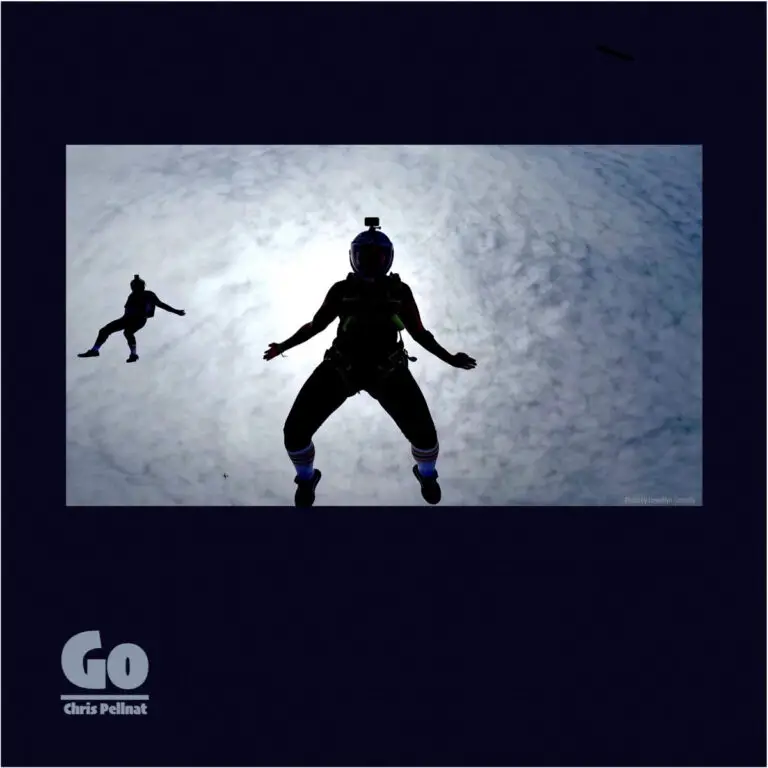When Hudson’s Chris Pellnat released his fifth solo album Go in September, it was yet another mark of a folk musician who simply can’t stick to just folk. While his songwriting stays pretty standard, his playful lyrics and eclectic instrumentation give him a signature mark.

With a well-filled out personal catalog, Pellnat’s collaborative resume has its marks as well. He’s one half of Brooklyn folk pop duo Teeniest. He’s the lead guitarist of Poughkeepsie group The Warp/The Weft, with whom he shows off his straightforward but technical approach through infectious lead riffs on albums such as 2019’s Dead Reckoning.
While the grunge and prog-rock tones of The Warp/The Weft and the upbeat folksy approach of Teeniest are relatively consistent, Pellnat likes his solo work a little all over the place. His 2021 record Crossing bounces from odd displays of vibraphone and clarinet to bright jangle pop to garage rock on a track-by-track basis, something which remains the same on Go, a 10-track, 30 minute exploration.
The opening titular track sets this tone from the get-go, with its wistful verses driven by vibraphone and gurgling synths setting the scene for Pellnat’s personal lyrics. “In my own way, trying to be better, braver wiser, and someday, I leave my burden down at the horizon,” he sings in an untrained tenor.
Pellnat created music videos for each of the record’s first three songs, each of which are brought together in a manner both amateurish yet endearing. “Go” is accompanied by a crude assembly of footage, including time-lapses of his rural Hudson Valley home, shots of him performing outdoors, and a frog.
Next is the adventurous and political “What Are We?” with its muted guitar riff and pulsating synth line that set the scene for Pellnat’s barrage of philosophical questions. “What if we are sick of the crazy, endless lies that will not die,” Pellnat sings on the final verse. “What if we are still trying to fight the evil power still inside?” It has an upbeat tension that reminisces of a storm chase or a search for a UFO.
The video’s combination of odd, color-imbalanced shots of his face juxtaposed with shots of an MRI scan through iMovie-adjacent transitions uphold the song’s mysterious energy, even in this DIY presentation.
Track three, “Existential Dread,” returns to the personal. It’s an upbeat and melodic dulcimer tune that follows the trope of cheery songwriting contrasted by dejected lyrics, as Pellnat talks about the failure of alleviating pain through vices and the permanence of existential dread. “Drinking won’t do it, weed won’t cut through it, I always knew it,” he sings on the chorus.
Its music video is easily the most absurd of the three, where Pellnat fights both caffeine and alcohol addiction alongside a vigorous quest to prove he’s not a robot through an endless series of CAPTCHA quizzes and corporate security questions.
Pellnat describes Go as “a rather positive statement overall” but also “colored by darkness,” with “Existential Dread” serving as an early example on the record. There’s also the sad accordion bluegrass of the following song “What I Want You To Want,” which mires itself in depressed romanticism. “No starry-eyed romantic, I’m talking about overcoming the darkness all around us,” Pellnat sings on the opening verse.
Later on is “Are We Going To Fly?” which despite being more vague in its brooding, is sonically the darkest point of the album with its uncanny guitar melody and echoing clarinet. “Are we going to find our way?” sings Pellnat. “Thought you said we had all day.” Backed by a skittering drum machine, this song shows Pellnat at his most off-kilter.
He still gives plenty of attention to the bright, earthy conventions common to Teeniest though, with exhibits such as the self-described jangle-fest “Earth Shaker.” It’s an endearing love song with summery guitars, making for a songwriting highlight. “Tumbling down the walls we made up, everything we will do it’ll last forever,” Pellnat sings on the chorus.
Then there’s penultimate track “Water Wings,” an acoustic/woodblock tune about climate change. “Typhoons in winter, tornado splinter, now you begin to taste the ocean breeze, it’s how its gonna be,” he sings on the second verse.
Closer “Suburbs of Paradise” continues with this commentary-oriented angle, as Pellnat sarcastically criticizes the uniformity of suburbia over a dusty slide guitar backdrop. He talks about how “the roads they’re all the same, they all just beat around the bush,” and talks about being trapped “in an endless cul de sac” in a short but sweet 1:52.
The other prime point of satire on Go is “This Is Not Rock and Roll,” where the salt and peppered musician calls himself “a walking cliché” with his guitar, says he’s “getting too old” to be a rock star over bluesy guitar licks and a warm plucky bassline.
Go is very personal album from Pellnat. Not in the sense that it’s constantly serious or sappy, but because it’s who he is. It’s vulnerable. It’s goofy. It’s political. It changes when it wants, and stays consistent when it’s comfortable. Chris Pellnat opened this album singing “in my own way” and never stopped, creating a record entirely built on his own endeavor.


Comments are closed.